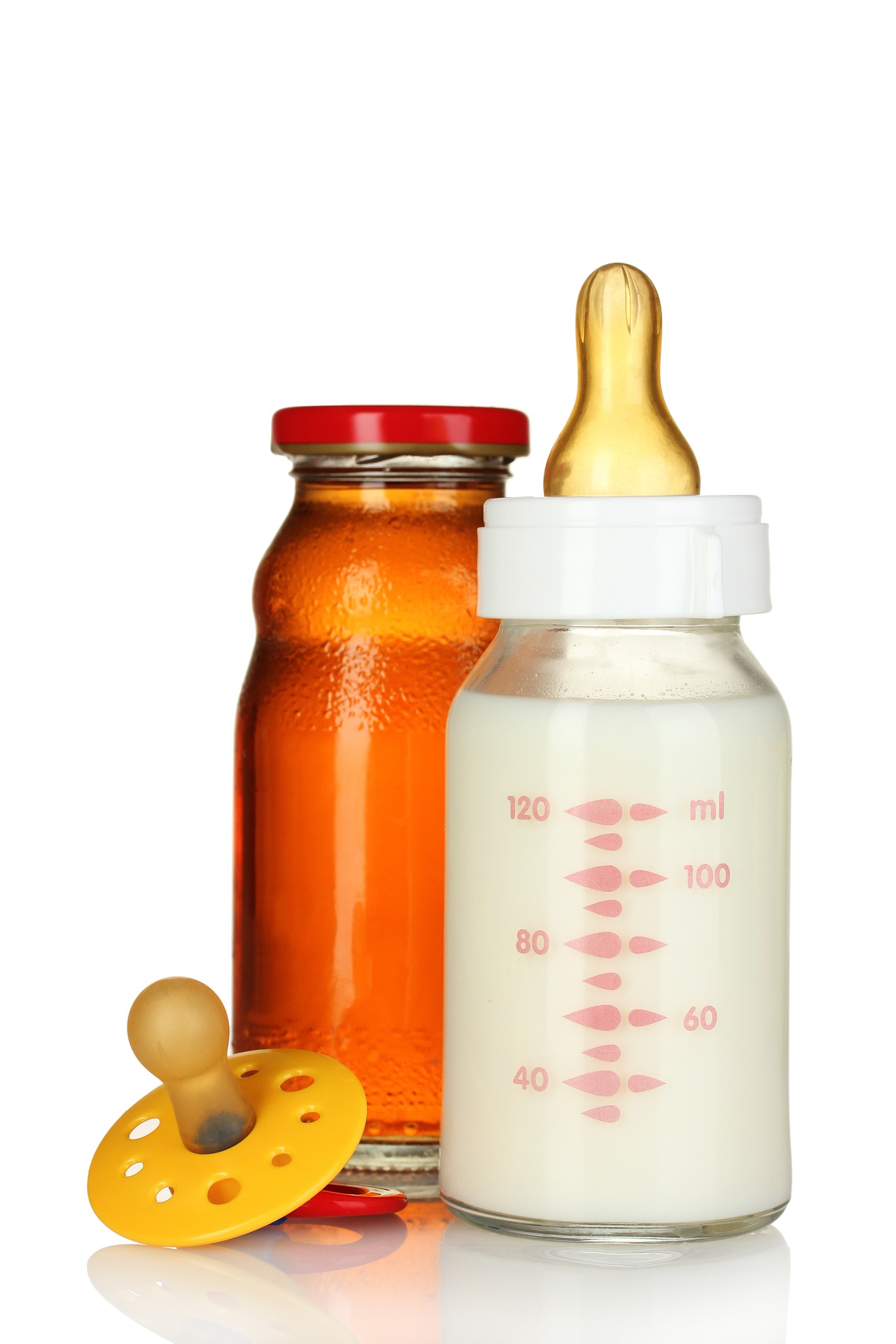
Ranking of the best anti-reflux mixtures for 2022
The best food for babies is mother's milk. But often, for one reason or another, babies are bottle-fed, and the problem of frequent and profuse regurgitation, or reflux, becomes especially relevant.
To solve it, special antireflux formulations were created. They may be based on locust bean gum or starch. They contain a number of proteins (in hypoallergenic products, the protein may be in a split form), vitamins, probiotics, fatty acids necessary for the growth and development of the child. some products contain palm oil.
An important indicator of the quality of antireflux nutrition is osmolality, or saturation with metals and salts. 320 mOsm is considered normal.
Such nutrition is most often therapeutic in nature and acts as a supplement to the main one that feeds the baby.But in some cases, it is possible to use only antireflux nutrition, especially when regurgitation is supplemented by food allergies, for example, to lactose. Not all antireflux formulations can be used as a complete diet, therefore, in order to avoid a lack of essential substances that can adversely affect the health and development of a child, you need to carefully study the components included in the composition, as well as consult a doctor.

Content
Anti-reflux mixtures based on gum
One of the main components for the production of anti-reflux nutrition is locust bean gum. This natural product in the form of an odorless white-yellow powder is obtained from its fruits - beans. He did not have any side effects or allergic reactions.
Gum is approved for use in the food industry, including in the production of food for children, in almost all countries of the world. In the list of food additives, it is designated as E410.
Its main feature is that dietary fiber does not dissolve in the stomach, but in the intestines, due to which the antireflux probiotic effect is achieved. But in case of an overdose, indigestion may occur, accompanied by colic and flatulence, so the amount of this substance in the composition of baby food is strictly regulated.
In the composition of products, gum acts as a thickener. After entering the stomach, it absorbs water and binds the rest of the dietary fiber, which reduces the risk of regurgitation. But starch-based formulations have even stronger thickening properties compared to gum-based products.
Starch-based anti-reflux mixtures
Starch, like locust bean gum, is a natural thickener and has a similar effect. For baby food, not only potato starch, familiar to the Russian consumer, but also rice and corn starch are used.
Because starch has even stronger thickening properties than gum, attention must be paid to the size of the opening in the nipple. It should be more than for feeding with regular formula or gum-based nutrition. In the stomach, it lingers longer, therefore, it provides the child with a longer effect of saturation, but it is not digested there, but reaches the intestine unchanged, having a beneficial effect on its work and on the state of the microflora.
The disadvantage of starch-based products is that they can cause constipation in the baby, while gum-based foods have the opposite effect. Some manufacturers carry out preliminary special processing of starch, which deprives it of this disadvantage.
The best manufacturers of anti-reflux mixtures
Many manufacturers of food products for babies have anti-reflux formulations in their assortment.
Gum-based products are produced by the following companies:
- Nutrilon;
- Nutrilak;
- Bellakt;
- Babushkino Lukoshko;
- Friso vom;
- Hipp;
- Humana.
Starch mixes can be found at the following companies:
- Nan;
- Nutrilon;
- Similac;
- Celia;
- Enfamil;
- Humana.
It is necessary to pay attention to how antireflux products are combined with the food used for normal feeding of the baby.
How to choose an anti-reflux mixture and how to give it correctly
When choosing this product, first of all, you need to pay attention to the advice of a pediatrician. He must also develop a scheme according to which it should be given to the baby, and determine its amount. Traditionally, with severe regurgitation, it is prescribed to give anti-reflux nutrition before each feeding in a volume of 30 ml. If regurgitation is moderate, the reception can be done through one feeding. It must be diluted strictly according to the instructions.
It is necessary to carefully study the composition for the presence of products in it that can cause allergies in the baby. You need to start accustoming to it with a minimum amount, carefully observing the body's reaction to a new product. In the event of any alarming symptoms, it must be replaced.
If the child is breastfed, it is better to give him an anti-reflux mixture with a spoon, and not from a bottle. Bottle feeding is much easier than breastfeeding and there is a risk that the baby may not breastfeed.
It is necessary to pay attention to what age children the product is intended for.As a rule, goods for newborns under the age of six months are marked with the number one, for babies from six months to one year - with the number two, for children older than one year - with the number three.
In addition to the usual ones, there are formulations with special additional properties, such as hypoallergenic and lactose-free, as well as those adapted for children born prematurely. The use of these products should be coordinated with the pediatrician in whom the child is observed.
Rating of the best antireflux mixtures
The rating is based on customer reviews of the Yandex Market trading platform among the products that are in the greatest demand.
Rating of the best gum-based mixtures
A popular view among both parents and pediatricians, the main component of which, unlike starch, does not have any side effects.
Bellakt AR
The average price for 400 g is 328 rubles.
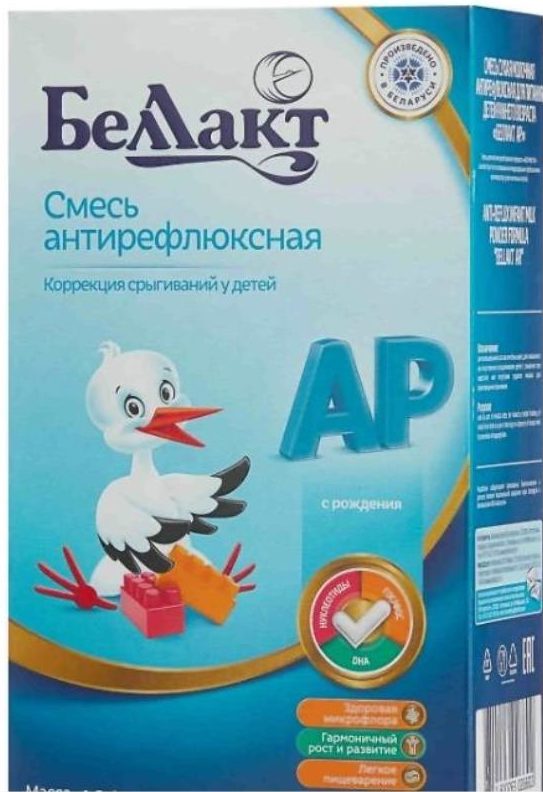
The manufacturing company is the only enterprise in Belarus that produces baby food, as well as products for pregnant and lactating women. In terms of production, it is the largest in the post-Soviet space. Can be used from the first days of life up to one year. Packed in a cardboard box.
- does not contain sugar, starch and preservatives;
- enriched with a full set of vitamins and microelements necessary for a baby in the first year of life;
- contains probiotics, including GOS and FOS complexes;
- attractive cost.
- not very convenient packaging;
- stirs for a long time;
- hard to find for sale.
Babushkino Lukoshko Antireflux Bio
The average price for 400 g is 420 rubles.
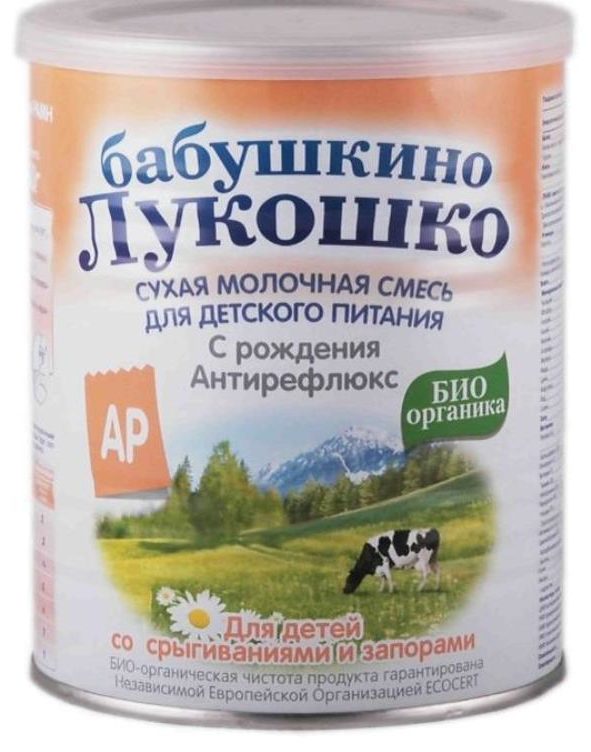
The Russian-made product is made from natural ingredients and combines high quality, certified by an independent European organization ECOCERT, and affordable price. Can be used from the first days of life. The packaging is a tin can with a plastic lid.
- does not contain starch and preservatives;
- enriched with a number of trace elements and vitamins;
- convenient packaging;
- budget cost.
- when used for more than one month, the effectiveness decreases;
- a number of components can provoke an allergic reaction.
HiPP Anti-Reflux
The average price for 300 g is 626 rubles.

This German-made product enjoys continued popularity due to its excellent quality and high efficiency. Can be used from the first days of life. Packaged in cardboard boxes.
- does not contain preservatives;
- has a complex of vitamins and microelements;
- contains a probiotic lactic acid culture (Lactobacillus fermentum hereditum).
- contains rapeseed and palm oil;
- inconvenient packaging;
- high cost for a small amount.
Nutrilak Premium
The average price for 350 g is 629 rubles.
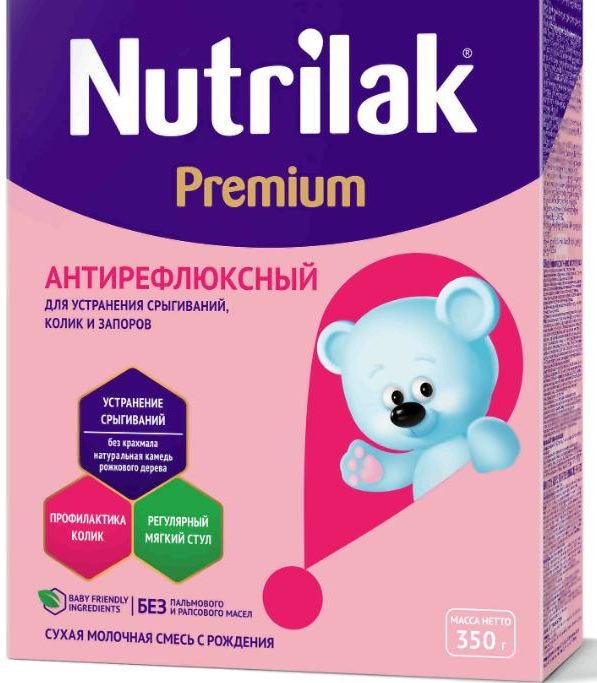
The popular product, produced by the Russian company Infaprim JSC, occupies a leading position in terms of sales compared to similar products. It can be used from the first days of a baby's life. Packed in cardboard boxes.
- does not contain starch, sugar, palm oil and preservatives;
- enriched with many trace elements and vitamins necessary for normal development;
- contains the Baby Friendly Ingredients complex, which contains components ideal for newborns from the world's leading manufacturers of baby food;
- significantly reduces regurgitation in babies;
- does not cause allergies.
- not very convenient packaging;
- high price for a small amount.
Friso VOM 1
The average price for 400 g is 641 rubles.
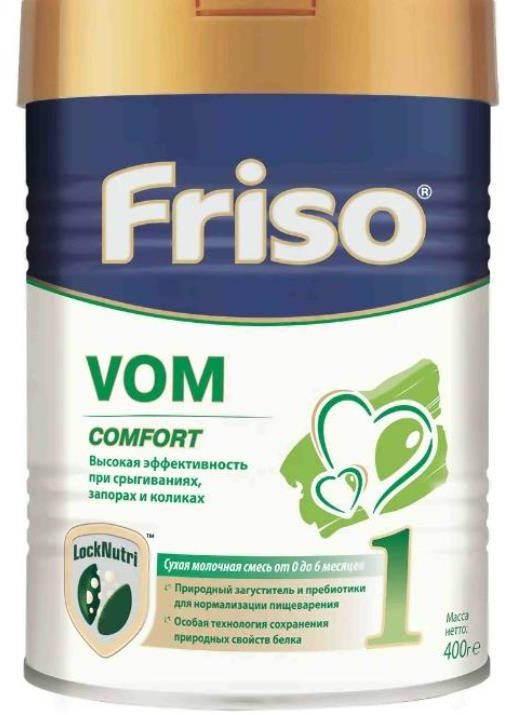
The product from the Dutch manufacturer is not as widely represented on the Russian market as the products of many competitors, but due to a number of undeniable advantages, it is in ever-increasing demand. Can be used from birth. Packed in a convenient jar.
- does not contain sugar, starch and preservatives;
- a balanced amount of bifidus and lactobacilli helps prevent constipation;
- the nucleotides included in the composition support immunity;
- has a full complex of vitamins and microelements necessary for full development.
- contains palm and rapeseed oils;
- poorly soluble;
- hard to find for sale.
HumanaAR
The average price for 400 g is 786 rubles.

A product of the highest quality, made in Germany, designed to meet all the needs of children, from the first days of their lives. More than 60 years of scientific research conducted by Humana serve as a guarantee of quality and allow the baby to fully develop. Packaged in cardboard boxes.
- does not contain sugar, starch, gluten and preservatives;
- enriched with omega-3 fatty acids;
- contains the whole range of essential vitamins and minerals.
- contains rapeseed and palm oil;
- inconvenient packaging;
- rarely found for sale.
Nutrilon (Nutricia)
The average price for 400 g is 790 rubles.
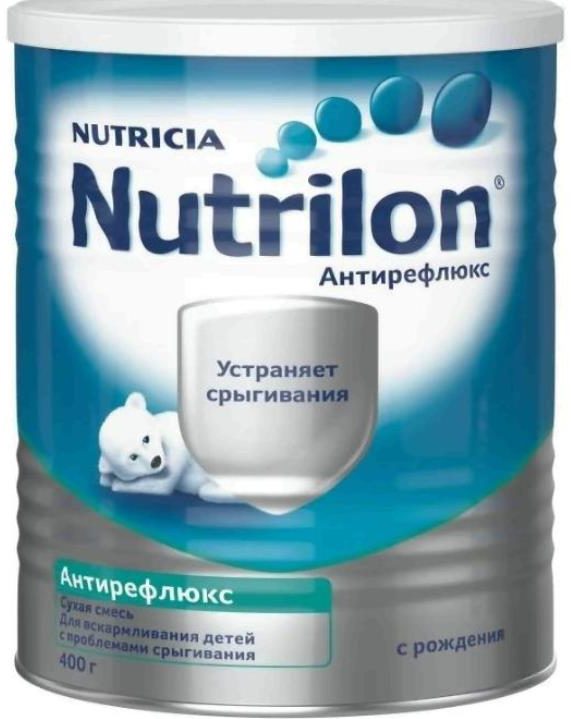
One of the most popular manufacturers, whose products are often used to feed babies even in maternity hospitals, produces a highly effective mixture based on gum and cow's milk. It can be used as an additional therapeutic food from the moment of birth.
- easy to find on sale;
- does not contain salt, sugar, starch and preservatives;
- enriched with vitamins and minerals;
- pleasant taste;
- dissolves well without forming lumps;
- packaged in a convenient tin can.
- not suitable for lactose intolerance;
- some components can provoke food allergies.
Rating of the best starch-based mixtures
Products with starch as the main thickener often perform better than gum-based products.
Celia AR
The average price for 400 g is 500 rubles.
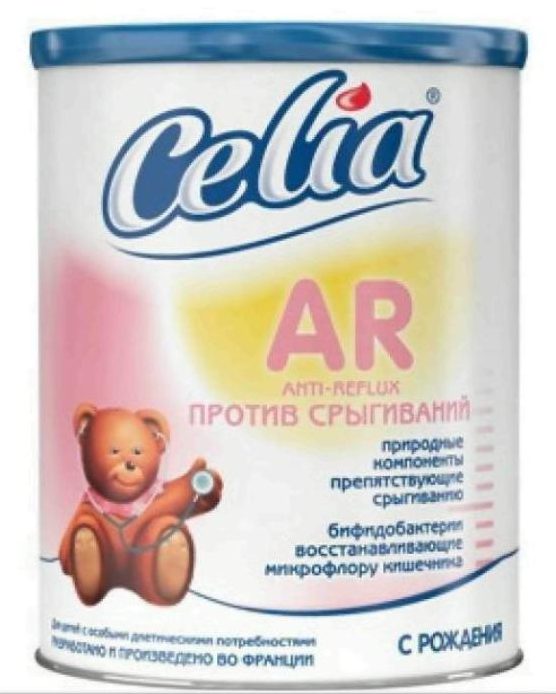
The dietary product from the French manufacturer is made on the basis of specially processed and gelatinized rice starch, which reduces the risk of constipation. Can be used from the first days of life. Packaged in a convenient tin.
- does not contain preservatives;
- enriched with bifidobacteria and probiotics;
- pleasant taste for most babies;
- high efficiency against regurgitation;
- convenient packaging.
- contains palm, rapeseed and soybean oil;
- not sold everywhere.
Enfamil A.R.
The average price for 400 g is 500 rubles.
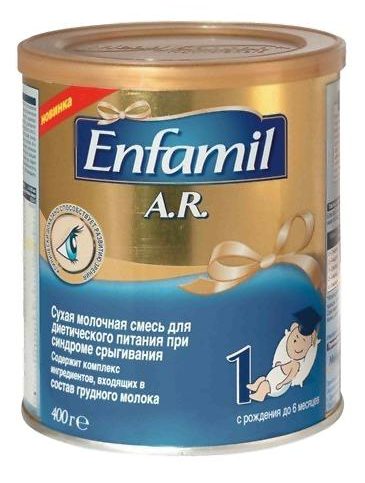
The product from the Dutch manufacturer of baby food products is made on the basis of high-quality rice starch. Designed for children from birth to six months, and for the age from 6 to 12 months. Packed in convenient tin cans.
- the composition is close to the composition of breast milk;
- does not contain preservatives;
- has a complex of all necessary minerals and vitamins.
- not suitable for lactose intolerance;
- may cause constipation.
Similac (Abbott)
The average price for 375 g is 620 rubles.

This Danish product, made from rice starch, is often found in pharmacies and on the shelves of baby food stores. The reason for this is its popularity among buyers due to its high quality. Suitable for babies from the first days of life. Packed in a convenient tin can with a plastic lid.
- can be used for feeding children with lactose allergy;
- contains a complex of prebiotics;
- does not contain preservatives, sugar and palm oil;
- high efficiency against regurgitation.
- high price;
- not a very pleasant smell.
Semper Lemolac
The average price for 400 g is 670 rubles.

A rice starch-based product from a Swedish manufacturer that produces a wide range of high quality baby food. The entire production process is under strict control, and the results of production are subjected to lengthy testing to detect side effects.
- mixes well;
- pleasant taste;
- a full range of minerals, vitamins and trace elements.
- sometimes causes constipation;
- awkward packaging.
NAN (Nestlé)
The average price for 400 g is 768 rubles.

A very popular Dutch brand that has long specialized in the production of a wide range of products for children, has in its assortment a product made from potatoes, which is suitable for babies from the first days of their lives.It is not suitable for lactose intolerance, since one of the components is cow's milk, but due to the content of partially digested proteins, it has hypoallergenic properties and is easily absorbed in the digestive tract. Packaged in a tin can with a plastic, tight-fitting lid.
- hypoallergenic;
- contains a number of probiotics and vitamins, including the unique L.reuteri complex;
- does not contain artificial additives, salt, palm oil;
- dissolves quickly and without lumps;
- helps to strengthen the immune system;
- convenient packaging.
- contains rapeseed oil;
- may contribute to constipation.
Modilac AR 1
The average price for 800 g is 1220 rubles.
A product from a French manufacturer based on corn starch is not yet very widespread on the Russian market, but due to its high quality it is gaining more and more fans. Designed for children from the first days of life to six months, Modilac AR 2 was developed for babies older than six months. Packed in cans.
- large volume of the bank;
- does not contain salt, sugar, artificial colors and flavors;
- enriched with a complete complex of vitamins and minerals.
- contains palm oil and rapeseed;
- may cause constipation;
- hard to find for sale.
Where could I buy
Like many other products, baby food can be purchased both in physical stores or pharmacies, and over the Internet. In the second case, the purchase must be approached with great responsibility, since the risk of receiving a fake, low-quality, expired or improperly stored product becomes much higher.You need to order mixtures only from trusted sellers with positive reviews.
All sorts of promotions and discounts can mean an attempt to sell products that have a short shelf life, or they have partially lost their properties due to errors in transportation or storage, so they should be treated with particular care.
When buying a mixture, you need to pay attention to the following points:
- age for which it is intended;
- the main substances and components included in the composition;
- the presence in the composition of preservatives, flavors, dyes, soy, gluten. In a quality product, these components should not be;
- characteristics: conventional anti-reflux, hypoallergenic, etc.
Listen to the advice of a pediatrician, carefully observe your baby - and let his childhood be cloudless!
Popular Articles
-

Top ranking of the best and cheapest scooters up to 50cc in 2022
Views: 131652 -

Rating of the best soundproofing materials for an apartment in 2022
Views: 127693 -

Rating of cheap analogues of expensive medicines for flu and colds for 2022
Views: 124520 -

The best men's sneakers in 2022
Views: 124034 -

The Best Complex Vitamins in 2022
Views: 121941 -

Top ranking of the best smartwatches 2022 - price-quality ratio
Views: 114981 -

The best paint for gray hair - top rating 2022
Views: 113396 -

Ranking of the best wood paints for interior work in 2022
Views: 110320 -

Rating of the best spinning reels in 2022
Views: 105331 -

Ranking of the best sex dolls for men for 2022
Views: 104369 -

Ranking of the best action cameras from China in 2022
Views: 102217 -

The most effective calcium preparations for adults and children in 2022
Views: 102012